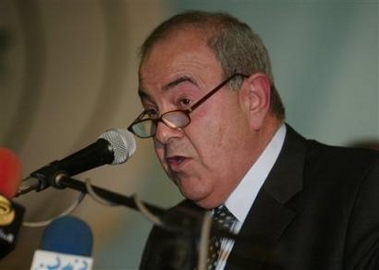|
Allawi, other centrists announce coalition
(AP)
Updated: 2005-10-18 10:35
Iraq's former Prime Minister Ayad Allawi and other secular leaders announced
a new coalition Monday they said unites moderate Sunnis, Shiites and other
political groups to run in December's parliamentary elections.
The coalition appeared to be aimed at striking a middle ground in Iraq's
sharply divided political scene, where parties have been strictly defined on
sectarian lines, including the Shiite and Kurdish groups that now dominate the
government.
"This conference is a major attempt to create a political bloc able to bring
unity to this country and intent on saving the people from sectarian strife,"
said Mahdi al-Hafidh, a former planning minister.
It also could be a vehicle for Allawi to try to return himself to a position
of influence. With strong U.S. backing, the secular Shiite was named prime
minister of an interim government put in place after American administrators
returned sovereignty to Iraq in June 2004.

Former Iraqi Prime Minister Ayad Allawi speaks
during a press conference in Baghdad, Iraq, Monday, Oct. 17, 2005.
[AP] | Allawi and his allies were swept out of
power in January parliament elections — the first national vote since Saddam
Hussein's fall in April 2003. Clerical-backed Shiite parties won a majority in
parliament and kept Allawi out of their coalition with the Kurds.
Monday's Iraqi Unity Conference was attended by politicians in the current
government, including Sunni Arab Vice President Ghazi al-Yawer, as well as
others outside the coalition — including Tariq al-Hashimi of the Iraqi Islamic
Party, which was the sole Sunni Arab party to support the new constitution ahead
of Saturday's nationwide referendum.
Allawi urged Iraqis to participate in the next elections, describing them on
Monday as "the most significant landmark in the Iraqi journey toward stability
and progress."
The Dec. 15 vote will select a new parliament. If the constitution is adopted
in Saturday's referendum — votes are still being counted — the new parliament
will select Iraq's first constitutional government. If it is rejected, the new
legislature will be temporary and draw up a new charter.
The referendum vote has sharply divided Iraqis, with Sunni Arabs widely
rejecting it and Shiites and Kurds in support.
"We have to end the split that has weakened moderates and to prepare a
cohesive bloc for the next elections," Adnan Pachachi, a prominent Iraqi Sunni
politician, said at Monday's conference.
|